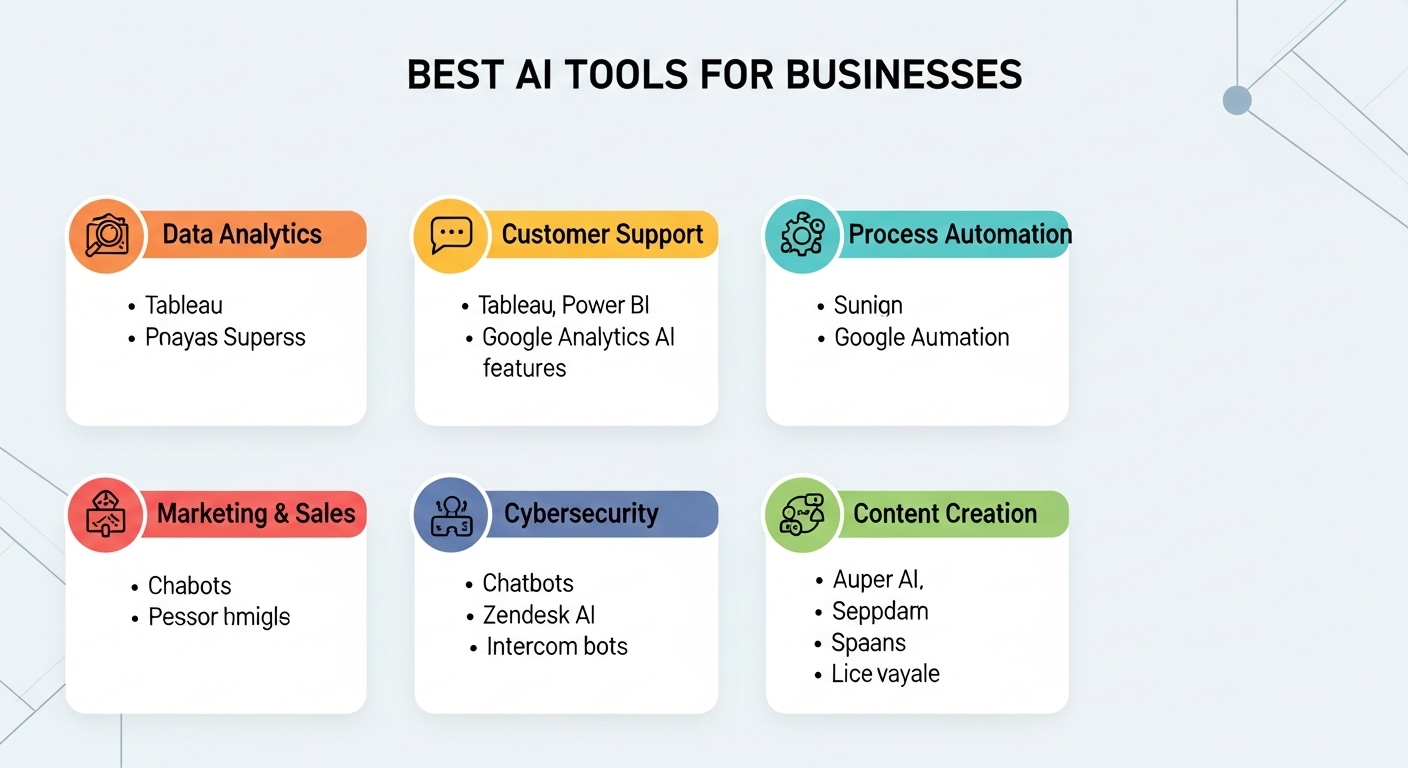Introduction to AI Tools in Business
Artificial Intelligence has shifted from being an experimental technology to becoming an essential part of modern business. Companies across industries are integrating AI-powered solutions into their workflows to automate repetitive tasks, enhance decision-making, and optimize operations. The role of AI tools in businesses today is not simply to save time but to transform how organizations engage with customers, manage resources, and develop new strategies. From customer support chatbots to predictive analytics systems, from marketing automation to intelligent process optimization, AI tools have become the backbone of innovation in the corporate world.
The Need for AI in the Business Landscape
The modern business environment is competitive, fast-paced, and data-driven. Organizations deal with massive amounts of information, customer demands evolve rapidly, and market conditions shift unpredictably. Traditional methods of managing such complexities often prove inadequate. AI tools step in to bridge this gap by providing data analysis at scale, automating routine tasks, and delivering insights that humans alone cannot generate quickly enough. Businesses that harness these tools find themselves more agile, efficient, and capable of staying ahead of the competition.
AI in Customer Service and Support
One of the most visible applications of AI tools in business is customer service. Chatbots and virtual assistants have become standard across websites, apps, and social platforms, providing instant responses to customer queries around the clock. These AI-driven systems can handle frequently asked questions, assist with product searches, and even process transactions, freeing human agents to focus on more complex issues. Natural language processing has enabled chatbots to understand customer intent more accurately, improving user experience and reducing frustration. Beyond chat, AI tools analyze customer interactions to identify patterns, predict concerns, and personalize support. This ensures that businesses not only solve problems faster but also build stronger relationships with their customers.
AI in Marketing and Sales
Marketing has always been about understanding customer behavior and creating targeted strategies, and AI has revolutionized this space. AI-powered tools analyze vast datasets to uncover trends in consumer preferences, purchasing behavior, and engagement. Businesses now use these insights to design highly personalized campaigns that resonate with specific audiences. AI tools can predict which leads are most likely to convert, enabling sales teams to prioritize their efforts. Email marketing platforms powered by AI optimize send times, subject lines, and content, increasing open rates and engagement. Social media tools use AI to track conversations, identify brand sentiment, and recommend strategies to enhance visibility. In e-commerce, AI-driven recommendation engines suggest products to customers based on their browsing history, increasing both sales and customer satisfaction.
AI in Data Analytics and Business Intelligence
Data is often called the new oil of the digital economy, but without the ability to interpret it, its potential remains untapped. AI tools in analytics allow businesses to process and make sense of massive amounts of information with speed and accuracy. Predictive analytics tools forecast market trends, customer behavior, and operational risks. Machine learning models identify hidden patterns in data that humans might overlook, offering insights that guide strategic decisions. Business intelligence platforms powered by AI generate visualizations, dashboards, and reports in real time, giving leaders the information they need to act decisively. This capability ensures that businesses can move from reactive decision-making to proactive strategies that anticipate changes before they occur.
AI in Human Resources and Recruitment
The recruitment process is another area where AI tools have had a significant impact. Hiring managers once relied on manual resume screening, which was time-consuming and often biased. Today, AI recruitment tools scan thousands of applications in minutes, identifying the best candidates based on skills, experience, and cultural fit. These tools can also analyze interview performance, flagging strengths and weaknesses. For ongoing workforce management, AI tools help predict employee turnover, identify training needs, and optimize team performance. This enables HR departments to build stronger, more engaged workforces while reducing costs associated with high attrition rates.
AI in Finance and Accounting
Finance departments across industries are embracing AI to enhance accuracy and efficiency. AI tools in accounting automate processes such as invoice management, payroll, and auditing. Fraud detection systems powered by AI analyze transactional data in real time to identify unusual patterns and flag potential risks before they escalate. Predictive tools in finance help companies forecast cash flow, budget more accurately, and prepare for economic shifts. For investment firms, AI algorithms assist in analyzing stock market trends and making portfolio recommendations. This application of AI ensures financial processes are not only faster but also more secure and reliable.
AI in Supply Chain and Operations
AI tools play a crucial role in optimizing supply chains, a sector often challenged by complexity and unpredictability. Machine learning models forecast demand, ensuring businesses maintain optimal inventory levels without overstocking or understocking. AI-powered logistics platforms optimize delivery routes, reducing costs and improving efficiency. In manufacturing, AI-driven predictive maintenance tools monitor machinery in real time, identifying issues before they cause breakdowns. This minimizes downtime and enhances productivity. Supply chain resilience, particularly in the wake of global disruptions, has been significantly improved by AI systems capable of simulating scenarios and recommending adaptive strategies.
AI in Cybersecurity
As businesses become increasingly digital, cybersecurity has emerged as a critical concern. AI tools are at the forefront of defending against cyber threats. Unlike traditional security systems that rely on static rules, AI-driven platforms adapt to new attack patterns and detect anomalies in real time. They monitor network traffic, identify unusual user behaviors, and flag potential breaches before they escalate. By learning from past incidents, these tools continuously improve their ability to recognize threats. In an era where data breaches can have devastating consequences, AI-driven cybersecurity tools provide businesses with a proactive shield against evolving risks.
AI in Content Creation and Communication
Communication and content production have also been transformed by AI. Businesses use AI tools to draft emails, generate reports, and even create marketing content. Natural language generation allows these tools to produce human-like text, saving time for employees and ensuring consistency. AI-powered translation tools enable companies to operate seamlessly across global markets, breaking down language barriers and improving international collaboration. For creative industries, AI assists in generating video scripts, designing graphics, and even composing music for advertisements. These innovations reduce the burden on creative teams while expanding the possibilities for storytelling and brand communication.
AI in Decision-Making and Strategy
Beyond operational improvements, AI tools have become vital in strategic decision-making. Decision-support systems analyze multiple scenarios, evaluate potential outcomes, and recommend optimal courses of action. For executives, this means moving from intuition-based strategies to data-driven decisions backed by predictive modeling. AI tools can simulate the impact of changes in pricing, supply chain adjustments, or marketing campaigns, giving leaders a clear picture of risks and opportunities. By leveraging these tools, businesses can navigate uncertainty with greater confidence and precision.
The Democratization of AI Tools
Initially, only large corporations with significant budgets could access AI tools. However, the rise of cloud computing and software-as-a-service models has democratized access, making AI solutions available to small and medium-sized enterprises as well. Today, startups can access the same predictive analytics, chatbots, or marketing automation platforms as industry giants, leveling the playing field and fostering innovation. This democratization has encouraged competition, as businesses of all sizes now harness AI to improve operations and customer experiences.
Challenges of AI Adoption in Business
Despite the clear benefits, adopting AI tools is not without challenges. One major concern is the cost of implementation, particularly for organizations without the infrastructure to support AI integration. Data privacy and security remain pressing issues, as AI systems often require access to sensitive information. Another challenge is the need for skilled professionals who can manage, interpret, and optimize AI systems. Without proper training and governance, businesses risk misusing AI or relying on outputs without critical evaluation. Ethical considerations also arise, particularly in recruitment and marketing, where AI decisions must be transparent and unbiased to ensure fairness.
The Future of AI Tools in Business
The trajectory of AI in business points toward even greater integration in the coming years. Future AI tools will likely be more autonomous, capable of making complex decisions with minimal human oversight. Advances in natural language understanding may allow employees to interact with AI systems as easily as speaking to a colleague, reducing barriers to adoption. Industry-specific AI solutions will continue to emerge, tailored to healthcare, education, retail, and more. Sustainability will also play a role, as AI tools are developed to reduce waste, optimize energy use, and support environmentally responsible business practices. The future promises not just incremental improvements but a reshaping of how businesses operate at their core.
Conclusion
AI tools have become indispensable in modern business, touching every aspect of operations from customer service and marketing to finance, supply chains, and decision-making. They enable organizations to harness the power of data, automate repetitive tasks, and uncover insights that drive growth. While challenges such as cost, ethics, and security must be carefully managed, the benefits of AI integration are undeniable. Businesses that embrace these tools position themselves not only to survive in competitive markets but to thrive as leaders in innovation. The evolution of AI in business is still unfolding, and the tools available today are only the beginning of what promises to be a transformative journey across industries worldwide.


